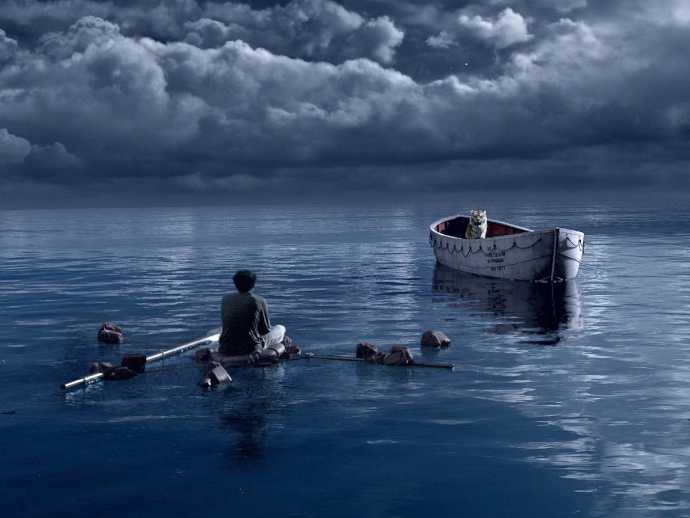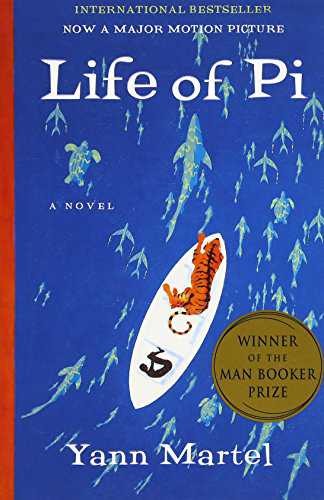"It's the plain truth: without Richard Parker, I wouldn't be alive today to tell you my story."
Pi
Life of Pi's extraordinary tale of a shipwrecked young Indian boy, who spends months floating at sea across the Pacific Ocean, is one of literature's most absorbing journeys.
What's more, that boy made that journey with an Orangutan, a Zebra, a Hyena, and a fully grown Bengal Tiger named Richard Parker.
When one picks up Life of Pi, there isn't much that can prepare you for the expansive adventure waiting within—an adventure that'll take you through exotic locations and spiritual musings.
Although Pi's journey is at the center of the story, the book makes it clear from the outset that he survives. This narrative structure makes the story more interesting because the driving question isn't "Does he survive?" but rather "How does he survive?"
We read the older Pi's account of his journey as he relays it with a sense of emotional guard—because even though we know he lives to tell the tale, the fates of everyone else in the story are uncertain.
Let's dive in a little deeper and explore what exactly makes Life of Pi not just an engrossing story, but an all-time literary classic.
Life of Pi's Embrace of Spirituality

Pi the character is fascinating long before he boards the doomed ship to Canada. The book spends a great amount of time carefully bringing across his deepest beliefs to the reader, without any judgment toward the reader for their own specific beliefs.
Pi's personality is formed by his belief in a multitude of religions as he comes to love the spirituality of life at a young age. His family, too, are bound by it in different ways: while his mother has a more traditional Indian spiritual outlook, his father comes across as a strong atheist.
Throughout Pi's childhood, the book builds up his relationships with his family. And while there are difficulties, it shows that his love for them is as deep as their love for him.
By the time Pi's fated drift-across-the-ocean journey comes to pass, it's his spirituality that holds him together. It's hard not to get lost in Pi's story because it has so many strong connections to love and faith, which makes Pi a deeply empathetic character.
Life of Pi's Central Themes

Life of Pi is a book filled with strong religious subtext, but religion isn't the central theme of the book. When Pi's ordeal comes to an end, the reader comes to realize that hope is the most powerful emotion.
As a character, Pi held out hope every day that he and Richard Parker would find their way back to the world. As a reader, you hope that Richard Parker won't perish as Pi's only companion—and, in many ways, only reason to survive.
The weight of loss is another key theme that comes across potently within the book's pages. When the ship inevitably sinks, Pi loses his whole family—but there isn't much time for Pi to mourn as his epic journey has just begun and it's wrought with peril.
It's only at the end—when Pi lays on the beach, finally ashore but unable to move from weakness—that the weight of everything he just went through hits him with an emotional knockout.
As the older Pi tells us of those moments, we're one with him. We too have felt his journey's pain, his personal sufferings, and the love he has for Richard Parker.
Pi's Relationship With Richard Parker

We're hard-pressed to name a single literary relationship between man and animal that's more complex and visceral than the incredible relationship between Pi and Richard Parker.
As Pi awakens and realizes that he's on a lifeboat with an Orangutan, a Hyena, and a Zebra, he's immediately faced with a problem: the Hyena is a carnivore and it won't lay idle while hungry.
When the Hyena begins to kill the other animals on the boat, it inevitably goes after Pi—and ends up instantly overwhelmed by the Bengal Tiger that was hiding under one-half of a tarp.
Richard Parker and Pi are then left on the boat by themselves, and now Pi has a much larger problem before him. Yet as the days and months go by, Pi and Richard Parker's relationship changes dramatically.
Pi's efforts to train the Tiger are successful to some degree. But it's not just training—it evolves past that. As the pair drift on, there's a connection between them that reaches the reader.
Pi's fear of Richard Parker is gone after a point, and both he and the reader know that the Tiger will not do him any harm. This is why Richard Parker's last moments with Pi are so devastating.
Their relationship is a reflection of many relationships that we've had, or will have, as readers. And when Pi weeps, we weep with him because we understand what that relationship truly means.
Why You Should Read Life of Pi

Life of Pi is a book for everybody, no matter where you're from or what you believe. The story offers multiple explanations for Pi's account of events—and those who wish to believe the alternate state of affairs will marvel at the use of potential allegory.
In the end, Pi's journey is a book that few will ever forget reading because it so potently attaches itself to one's emotions and holds your attention long after finishing the book.


